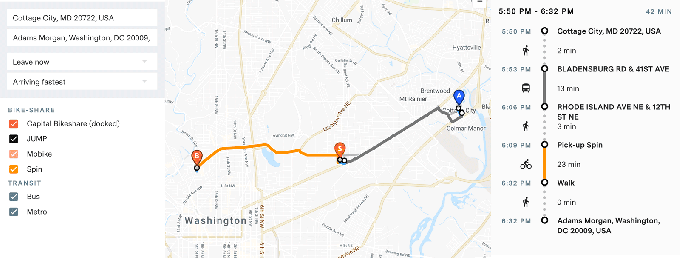Humans still have an edge over computers when it comes to navigating a city. In areas we are familiar with, we know precisely the cadence of traffic, when to avoid the subway, when biking makes sense and how that all fits with the current weather and our moods. We have transit intuition, which is why we get so frustrated when Google Maps suggests a route that just doesn’t match the available options to get around.
Yet, even humans are starting to break down under the increasing complexity of mobility options. Whether it’s subways or buses failing or new options like bike shares, electric scooters or crowdsourced bus routes becoming available, our intuition on how to get to our destinations can be out-of-date or quite simply wrong. In the patchwork quilt of transit options available in most American cities, people often need to take two or even four different modes of transit just to get to their final destinations.
That’s where urban data startup Coord comes in. A spin-out of Alphabet-owned urban innovation org Sidewalk Labs, Coord wants to make it easy for developers to build mobility-rich applications using the best data available. Today, the company is announcing a fusion of its Routing API and Bike Share API, which will allow app developers to perform multi-modal pathfinding — including transit and bike shares — in a snap. The company has released a demo router app to experiment with, as well.
As benign as that announcement sounds, routing remains hard for most transit users according to Stephen Smyth, a co-founder and CEO of Coord. If a trip includes multiple types of transit, “You probably still need to run 2-3 apps to make that trip happen,” he explains. “Frankly, in this day and age, it feels like more work than it should be.” We buy complicated airline itineraries using simple online travel agents, so “why can’t we have that in urban transportation?”

Coord’s API fuses bike share and other data together for more seamless mobility experiences
In order to offer those well-abstracted endpoints to developers though, Coord has had to do painstaking work to collect and normalize transit data from across the country. Its first API was for curbs, which sounds about as interesting as watching water boil. However, Smyth said, “It’s hard to come up with something that is more useful but less understood.” Curbs determines street parking, transit flow and so many other critical variables to getting transit right. Yet, as important as those questions are, most cities in the United States actually have no idea what curbs are used for, which meant that there was no data set actually available.
So Coord built a surveyor app based on augmented reality so that they could walk up and down sidewalks and automatically collect this data, identifying things like curb paint and hydrants to create a map of potential curb usage. It then normalized all that data and offered it to developers in a slick API so that everyone else can build on top of its platform.
Coord has performed the same painstaking data normalization for toll roads (there are more than 200 of them, and almost all use their own proprietary data format, which required the company to integrate with all of them) as well as bike sharing (dozens of providers across the country). With those data sets in place, the company was able to offer a comprehensive router API that integrates all that data into one clean set of endpoints.
“Ultimately, we are building a platform for the mobility market, which we define as buying and selling mobility services,” Smyth says of Coord. His mission is to make transit data as open and easily accessible as possible so that developers can integrate transit options into their apps, and also be responsive to new mobility options as Silicon Valley entrepreneurs invent them.
Coord wants to be a neutral data broker, which means that it doesn’t attempt to advocate for a particular mode of transit to users and urban planners alike. Instead, it wants to provide an objective look at what options are available and how they work together so that apps and ultimately end users can make their own decisions. Smyth said, “I used to be in the edtech space, and what I learned from that experience is that data, and insights from data, is what gives public officials and elected officials the confidence to make policy changes.”
As the scooter wars heat up, and autonomous vehicles increasingly ply the roads, it’s the data platforms like Coord that will undergird those mobility experiences. Humans may have had the upper hand in knowing how to get from there to here, but computers are quickly gaining that native intuition and providing the right advice on how to realistically navigate complex cities.
